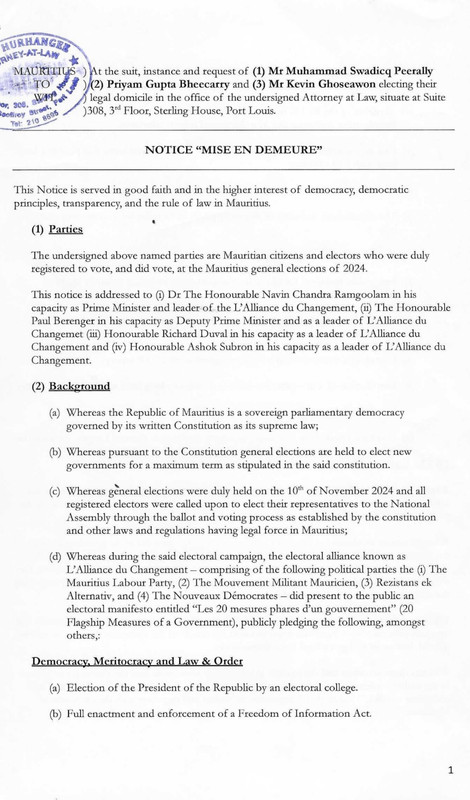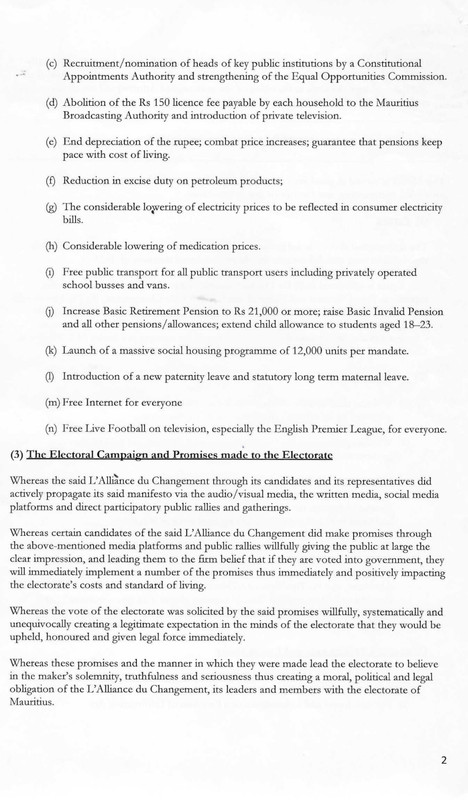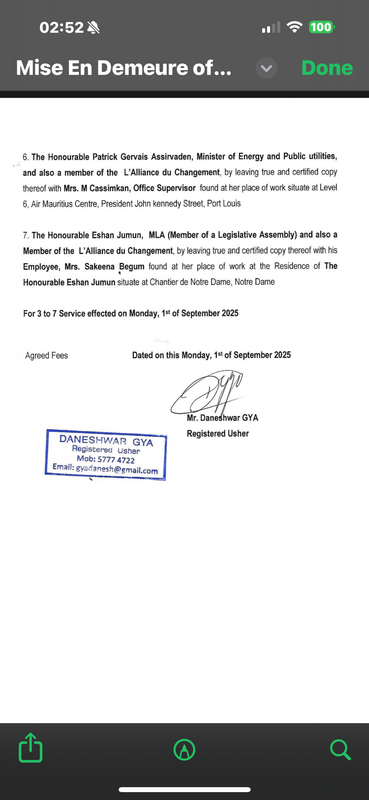The First Lawsuit Against Democracy Fraud

For the first time in modern democratic history, a government faces a lawsuit not for corruption, embezzlement, or abuse of power, but for lying to its people in a manifesto. In Mauritius, three citizens have served a mise en demeure — a formal legal notice — on Prime Minister Navin Ramgoolam and the leaders of the ruling Alliance du Changement, accusing them of “democracy fraud.”
The notice demands that campaign pledges — fuel price cuts, higher pensions, free public transport, cheaper food, and internet access — be honoured within weeks. Failure, it warns, will trigger proceedings before the Supreme Court and calls for new elections within 120 days.
This is not just a local quarrel. It is a world first. No government anywhere has ever been served with a legal notice accusing it of betraying democracy itself.
Promises Broken, Trust Shattered
The coalition that took power in November 2024 sold voters a vision of immediate relief. Its manifesto promised a Rs 20 cut in fuel prices, reduced electricity tariffs, cheaper food, an increase in the Basic Retirement Pension to Rs 21,000, free public transport, free internet, and even live broadcasts of English Premier League football.
Nine months later, not one of these pledges has materialised. Instead, Mauritians are paying record prices for food and fuel, while the rupee slides and pensions erode.
The government’s excuse has been consistent: there is no money. Ministers point to global shocks and to the warnings of credit-rating agencies such as Moody’s. But the numbers tell another story. In June 2025, the Finance Ministry projected a manageable budget deficit of 3.4% of GDP. By September, the reality was 9.8% — a shortfall of Rs 43 billion. One senior economist, speaking to The State of the Mind, called the budget forecasts “optimistic to the point of fiction.”
For ordinary households, these illusions translate into higher supermarket bills and shrinking purchasing power. Mauritians were promised relief. What they received instead was deception.
A Prime Minister in the Dock
The irony is cruel. The man now accused of democracy fraud is already battling unresolved court cases over Rs 220 million in unexplained cash found in his residences. Each time he appears in court, new procedural obstacles delay proceedings. The very institution meant to prosecute him, the Financial Crimes Commission (FCC), is appointed through the President — who is himself nominated on the Prime Minister’s advice.
The result is a hall of mirrors: a Prime Minister under investigation, overseen by institutions he indirectly controls. Justice moves in circles. For critics, the new mise en demeure simply confirms what they have long argued — Mauritius is a democracy run for elites, not citizens.
What the Mise en Demeure Says
The notice does not deal in abstractions. It reads like a compliance order, with deadlines and sanctions. It states:
“You are hereby given notice to, within twenty-one (21) days, implement forthwith your principal promises as set out in your manifesto, namely: reduce the price of petroleum products by Rs 20 per litre, reduce electricity tariffs, reduce the price of basic food commodities, increase the Basic Retirement Pension to Rs 21,000, provide free public transport, provide free internet access, and ensure free live broadcast of football matches.”
It continues:
“Within thirty (30) days, you shall publish a clear, transparent and time-bound roadmap for the delivery of all other promises made in your manifesto.”
And the ultimate sanction:
“Should you fail to comply with the above, you shall, within one hundred and twenty (120) days, cause the dissolution of the National Assembly and call for new general elections.”
The notice also denounces the government’s reliance on foreign credit-rating agencies:
“You shall immediately desist from outsourcing your sovereign obligations to private foreign financial intermediaries such as Moody’s, which cannot override the commitments you have made to the People of Mauritius.”
Finally, it warns of escalation:
“Failing compliance, we shall proceed before the Supreme Court of Mauritius for appropriate constitutional remedies, claim damages for misrepresentation and breach of trust, and mobilise a national and international campaign, including strikes, protests, and calls for the dissolution of Parliament.”

A World First
Around the world, governments break promises every election cycle. But no citizens have ever dragged their leaders into court with such precision.
- In India, Kenya, and South Africa, courts have occasionally invoked “legitimate expectation” to force governments to honour specific pledges, such as subsidies or licences. But never has an entire manifesto been treated as binding.
- In the UK, US, and Europe, manifestos are explicitly classed as political speech. Courts refuse to intervene even when promises collapse — from Britain’s Brexit slogans to America’s failed “Obamacare repeal.”
- In France and Canada, the mise en demeure exists in law, but it is used for commercial disputes, not to accuse a government of betraying democracy.
Mauritius has crossed a new frontier. For the first time, a government is accused in black and white of “democracy fraud” — the idea that lying to voters is not politics but misrepresentation, enforceable in law.
The Courage of Citizens
Behind the legalese lies an act of heroism. In Mauritius, where institutions bend easily to the powerful, three citizens — Muhammad Swadiq Peerally, Priyam Gupta Bheecarry, and Kevin Ghoseawon — dared to confront the government with the very instrument it abuses: the law. Their lawyer, Me Nundah Hurhangee, reframed the manifesto as a contract. By doing so, he handed citizens a new democratic weapon: the right to hold leaders accountable not just in parliament, but in court.
As the author, I cannot pretend neutrality. I voted for the Alliance du Changement because they promised to build a 24/7 hospital for animals. Nearly a year later, not one sitting MP has fed a stray dog, let alone delivered the basic compassion they pledged. It is about time Mauritians — and citizens everywhere — support this kind of legal action. Far from libel, it is democracy in its purest form: demanding truth in exchange for votes.
This is not theatre. It is heroic. And it deserves to be copied elsewhere.
The Mirage Exposed
For decades, Mauritius has been marketed as Africa’s miracle island, exporting sugar, seafood, and offshore services while importing accolades from the IMF and World Bank. Yet behind the brochures lies a system that exports prosperity and imports hunger, cooks its budget books while debt balloons, and shields its leaders while citizens queue for overpriced onions and tins of tuna.

The mise en demeure is more than a legal filing. It is the first crack in the façade — the moment when citizens decided the miracle was a mirage.
The State of the Mind’s Mission
Since its founding, The State of the Mind has worked to expose how elites manipulate democracy in the Global South. This act belongs to the brave citizens of Mauritius — but it also belongs to every democracy where promises have become disposable.
We celebrate this precedent, not just as journalism but as a call to action. Let others follow: in Africa, in Asia, in the Indian Ocean. Let citizens everywhere remind their rulers that democracy is not theatre. It is a contract. And contracts can be enforced.







Add comment
Comments
Laudable initiatives by these three bold , daring and courageous Citizens
Courage and best of luck. God bless you for the bold action. I strongly support the action.